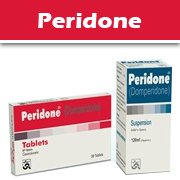- Peridone Tablet contains Domperidone 10mg
- Peridone Syrup (each 5ml) contains Domperidone 5mg
How Peridone Works?

The antiemetic properties of Peridone are related to its dopamine receptor blocking activity at both the chemoreceptor trigger zone and at the gastric level.
[image]What is Peridone Used For? > Indications
Peridone Tablets and Syrup are used to treat delayed gastric emptying of functional origin with gastro-esophageal reflux and/or dyspepsia, control of nausea and vomiting of central or local origin, facilitation of radiological examination of the upper gastro-intestinal tract, prevention and symptomatic relief of nausea/vomiting due to any cause e.g, migraine, head injury, pancreatitis, gastritis, hepatitis, post-gastrectomy syndrome, hemodialysis and dysmenorrhea and specifically associated with cytotoxic therapy and radiotherapy, levodopa and bromocriptine treatment.
Recommended Dosage of Peridone Tablets
One tablet 3 to 4 times a day, preferably before 30 minutes before meals or as directed by your doctor.
Recommended Dosage of Peridone Syrup
Acute Conditions (Mainly Nausea, Vomiting)
Adults: 20mg (20ml of suspension) 3-4 times daily, 15 to 30 minutes before meals and, if necessary, before retiring to bed (or as directed by the physician).
Children: 5mg (5ml of Suspension) per 10kg body weight, 3-4 times per day, 15 to 30 minutes before meals and, if necessary, before retiring to bed (or as directed by the physician).
Chronic Conditions (Mainly Dyspepsia)
Adults: 10mg (10ml of Suspension) taken 3 times daily, 15 to 30minutes before meals and if necessary, before retiring to bed. The dosage may be doubled in severe cases (or as directed by the physician).
Children: 2.5mg (2.5ml Peridone Syrup) per 10kg body weight taken 3times daily, 15 to 30 minutes before meals and, if necessary before retiring to bed (or as directed by the physician).
When to avoid Peridone?
This medicinal product is not recommended for patients with known allergies to domperidone.
Peridone Tablets or Suspension should not be used whenever stimulation of gastric motility is to be avoided or could be harmful and in the presence of gastro-intestinal hemorrhage, obstruction or perforation.
Peridone Side Effects
In placebo-controlled trials, incidence of side effects has not differed from placebo. This drug does not cross the normally functioning blood brain barrier and therefore does not interfere with central dopaminergic system. In some cases allergic reactions such as rash or urticaria, abdominal cramps and dystonic reactions (Extrapyramidal phenomenon) may occur.
Keep all drugs out of the reach of children and never take any medication (including Peridone) without asking a qualified healthcare professional.
Leave A Comment